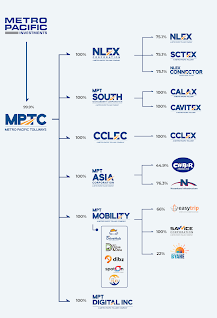The Philippines' vast archipelago is connected by a complex network of roads, and a crucial component of this network is the extensive system of expressways.
These high-speed toll roads provide efficient transportation options, reducing travel times and promoting economic growth. Behind the scenes, various tollway companies play a pivotal role in constructing, maintaining, and operating these vital expressways.
 |
| Skyway Toll Plaza |
In this guide, we'll explore the key tollway companies in the Philippines and their significant contributions to the country's expressway network.
Loading...
HELPFUL ITEMS YOU CAN USE FOR DRIVING!
Here's my list of useful items for you and your vehicle:
Shopee is my go-to app for things I needed like the ones above. If you'd like discounts and vouchers, you may get the best offers here:
1. Metro Pacific Tollways Corporation (MPTC)
As one of the Philippines' largest and most influential tollway operators, MPTC holds the concession for several critical expressways, including:
- North Luzon Expressway (NLEX): NLEX connects Metro Manila to Northern Luzon and serves as a major trade route.
- Subic-Clark-Tarlac Expressway (SCTEX): SCTEX links Subic Bay Freeport Zone, Clark Freeport Zone, and Tarlac City, facilitating commerce in Central Luzon.
- Subic Freeport Expressway (SFEX): This expressway connects NLEX and SCTEX to the Subic Bay Freeport Zone, supporting trade and logistics.
- Manila-Cavite Expressway (CAVITEX): CAVITEX provides a faster route from Metro Manila to Cavite, promoting economic development in the area.
- Cavite-Laguna Expressway (CALAX): CALAX enhances connectivity between Cavite and Laguna, benefiting residents and businesses alike.
MPTC's dedication to innovation and quality road infrastructure has significantly contributed to improving transportation in the Philippines.
2. San Miguel Corporation (SMC)
San Miguel Corporation, another major player in the Philippine tollway industry, manages a portfolio of expressways, including:
- South Luzon Expressway (SLEX): SLEX connects Metro Manila to Southern Luzon, offering a key route for travelers and freight transport.
- Skyway: The Skyway system, including Skyway Stage 1 and Skyway Stage 2, provides elevated expressways within Metro Manila to alleviate traffic congestion.
- NAIA Expressway: Linking Metro Manila to the Ninoy Aquino International Airport (NAIA), this tollway enhances airport accessibility.
- Star Tollway: Running through Batangas, Star Tollway is vital for connecting municipalities in the province.
SMC's involvement in the tollway industry reflects its commitment to improving transportation infrastructure and supporting economic growth.
3. Ayala Corporation
Ayala Corporation's subsidiary, AC Infrastructure Holdings Corporation, is involved in developing and operating tollways in the Philippines. One of its notable projects is the Muntinlupa-Cavite Expressway (MCX), which connects Muntinlupa City to Cavite. MCX offers a more efficient route for residents and commuters in the area.
ATTRACTIONS TO SEE IN MANILA
Klook.com4. Private-Public Partnerships (PPP)
Several expressways are built and operated through public-private partnerships (PPPs) between the government and private companies. These partnerships have been instrumental in expanding and modernizing the country's expressway network.
Tollway companies in the Philippines work closely with the government to fund, construct, and maintain expressways. These partnerships help ease the financial burden on the government and ensure the development of world-class road infrastructure.
ACTIVITIES AND TOURS IN MANILA
In conclusion, the tollway companies in the Philippines play a crucial role in shaping and expanding the country's expressway network. Their investments in modern infrastructure not only enhance connectivity but also contribute to economic growth by reducing travel times, improving logistics, and fostering regional development.As the Philippines continues to grow and evolve, these tollway operators will remain integral in building a more efficient and interconnected transportation system for the nation.
















No comments
Let us know your thoughts!